
I want to share some thoughts with you on what we traditionally refer to as the “Parable of the Prodigal Son.” Actually, a far more accurate moniker would be the “Parable of the Two Sons.” You’ll see why I say this in a bit, so stay tuned! We find this story in Chapter 15 in Luke’s account of Jesus’ life and ministry.
Setting the Stage
Before we dig into Jesus’ story itself, let’s first examine His audience that day because it is crucial to our full understanding of the parable itself:
Many dishonest tax collectors and other notorious sinners often gathered around to listen as Jesus taught the people. This raised concerns among the Jewish religious leaders (the Pharisees) and experts of the law (the scribes) . Indignant, they grumbled and complained, saying, “Look at how this man associates with all these notorious sinners and welcomes them all to come to him!”
Luke 15:1-2 TPT (parentheticals mine)
Thus, we have two groups present on this occasion:
- Religious outsiders, and;
- Religious insiders
1. The Religious Outsiders
-
Tax Collectors
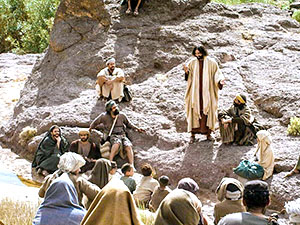 The tax collectors had sold out to the Romans, traitors to their race and nation. Compounding their treason, they would greedily mark up the prescribed tax and then pocket the difference.
The tax collectors had sold out to the Romans, traitors to their race and nation. Compounding their treason, they would greedily mark up the prescribed tax and then pocket the difference.When people were unable to meet their tax obligation and asked for payment terms, collectors would charge them huge percentages of interest. If folks could not meet these exorbitant terms, the collectors would foreclose and sell off the delinquent tax-payer’s belongings. This typically left the family homeless and in abject poverty. If foreclosure did not cover the amount owed, they would even sell the debtor into slavery, possibly along with his wife and children. Once the tax and interest were paid off, any overage went into the tax collector’s coffers. Imagine a mash-up of the IRS with loan-sharking as run by our modern-day Russian Mafia when it comes to avarice and ruthlessness and you are getting the idea.
Jews and Romans alike despised tax collectors because everyone is contemptuous of traitors. Jews regarded them as far lower than their Roman masters — they had accepted the Romans were going to be oppressive jerks, but selling out to the enemy? Unforgivable!
Please note Matthew had been a tax collector when Jesus called him to be His disciple.
-
Sinners
Sinners were anyone who was racially a Jew, but did not actively practice Judaism or engage in holy living. Like modern-day “cultural Christians,” most were functional atheists living their lives in complete disregard for The Almighty. Most were drunkards and adulterers, worthless layabouts who pimped, defrauded, and robbed to feed their own debauchery.
They were no better morally than tax collectors, but at least had not publicly sold out to the Romans. I would imagine, however, these guys had more often than not had functioned secretly as informants, blackmailers, and outright spies for their oppressive overlords. Such folks were essentially the ancient equivalent of modern-day gangbangers.
2. The Religious Insiders
-
The Legal Experts (aka Scribes)
These guys were genuine scholars, experts on anything and everything written in what we now call the Old Testament. Their grasp of the Scriptures was literally encyclopedic. They not only knew what the Bible said on any topic you could name, but also knew where to find it!
It was a challenge to deal with the Bible back in those days. Though the words are identical across the millennia, the Scriptures in Jesus’ time were not physically packaged in relatively effortless-to-use volumes like our modern Bibles.
What they had were scrolls. Scrolls were lengths of specially prepared sheepskin rolled onto a spool at each end. For centuries before and since the time of Christ, such scrolls have been fixtures in Jewish synagogues. Scrolls have no pages or tables of contents or indexes. Their texts were not subdivided into easy-to-find chapters and verses.
The scribes were essentially human printing presses, hence their name. Their primary mission in life was laboriously transcribing the Scriptures from one scroll to another, all written by hand using pen-and-ink. Spend your entire life in such a disciplined pursuit and you would be a subject-matter expert, too!
 It was a labor of love and devotion to the One True God and they took their responsibilities quite seriously. Just for one example, every time they encountered the name of God in the texts, they would stop writing and pray before proceeding.
It was a labor of love and devotion to the One True God and they took their responsibilities quite seriously. Just for one example, every time they encountered the name of God in the texts, they would stop writing and pray before proceeding.Their accuracy and effectiveness at this crucial task cannot be understated or minimized. We owe our very salvation to their labors because the teachings of Jesus and His apostles are founded upon the Old Testament those scribes so arduously transcribed.
The downside was these scribes were doctrinally aligned with the Pharisees and tended to hang with them.
-
Pharisees
The Pharisees were hyper-religious, hypocritical Bible-thumping fanatics. Not only were they were deluded they were sitting at God’s cool-kids’ table, but they had appointed themselves as gatekeepers of who was allowed to sit with them. Those failing to live up to their almost-impossibly high standards of outward conduct and religious practice were judged as “less-than” and relegated to the outcasts’ tables.They were intently focused on strictly keeping the Law of Moses as well as their empty religious traditions-of-men. Unfortunately, they had mentally redacted all those passages in the Old Testament where God talks about humility, compassion, love, mercy, forgiveness, and generosity towards their fellow men. They were far more interested in appearing holy outwardly than being godly inwardly.
Amazingly, these guys actually started off quite admirably. Their loudly praying while standing on street corners, fanatical enforcement of keeping the Sabbath, and other ostentatious displays of Jewish piety, were legacy behaviors from the Maccabean Revolt (see sidebar for details). During that rebellion, their forebears used to perform such acts at the risk of their very lives as they openly defied the repressive laws decreed by a megalomaniac emperor.
The problems began once the reason for such public displays no longer existed and their courageous acts of defiance became no longer necessary. Instead of dying out along with the revolt, such behaviors devolved into religious traditions practiced because, well, that’s what we Pharisees do, thank you very much! As a result, their brand of Judaism simply became merely another flavor of man’s religion, where they performed dead religious works to be seen by others.
The Pharisees eventually disbanded a few short years after Titus razed both Jerusalem and Herod’s temple in 70 AD.
The Fullness of Time
Galatians 4:4 proclaims “…when the fullness of the time had come, God sent forth His Son…” Various theologians have expressed this “fullness of time” as the culmination of four geopolitical and societal factors:
- The Pax Romana — This made international travel relatively safe which meant missionaries could spread the Gospel more easily than at any prior time in history.
- Koine Greek — This is the original language of the New Testament and was the universal language of commerce within the Roman Empire. This lingua franca made the verbal and written expression of Christ’s Gospel easily understood by everyone.
- The Synagogue System — This arose during the Babylonian Captivity because the Jews needed local places of worship to replace their demolished temple several hundred miles away in a razed Jerusalem.
After the captivity, they brought this idea of a network of small congregations back with them. That network then spread throughout the succeeding empires. Synagogues provided Jesus — and later His apostles — with local congregations of devout Jews to whom they could minister.
- Anticipation of a Messiah — The widespread Jewish expectation of a Mashiach (Messiah) to deliver the Jews from imperial oppressors once and for all also arose out of the Babylonian Captivity. The concept steadily gained steam over the centuries. By the time of the Roman occupation, the belief was almost universal. Without this, there would have been no Palm Sunday, no Good Friday, no Easter, and therefore no Christianity — we’d all still be dead in our sins.
The Fifth Element
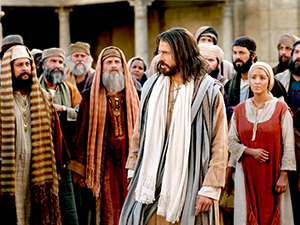 Personally, I feel a crucial fifth factor, the existence of the Pharisees, is missing from their scholarly list. Here’s why I say this:
Personally, I feel a crucial fifth factor, the existence of the Pharisees, is missing from their scholarly list. Here’s why I say this:The Pharisees provided Jesus with a readily available and highly visible example of empty tradition and dead religious works against which He could differentiate Himself, His teachings, and, by extension, our Heavenly Father.
Only about 6,000 Pharisees existed in the entire nation of Israel in Jesus’ time. However, the power and influence they wielded in the daily and religious lives of the general populace far outstripped their paltry percentage of the population.
Jesus publicly tweaked their noses at every opportunity. Their domination of the nation’s religious scene made this imperative. He constantly pointed at them, proclaiming by word and deed to one and all, “I’m not like them! I do not stand for what they stand for! This is not what God wants from us!”
Healing folks on the Sabbath was His favorite tactic because it killed two birds with one stone. A person received their badly needed healing while the Pharisees witnessing the miracle went ballistic. On many other occasions, Jesus confronted them publicly, directly, and forcefully; His scathing condemnations of them recorded in Matthew 23 and Luke 11:39-53 are probably not the only occasions where He verbally reamed them!
In summary, He stood against everything the Pharisees said, did, and represented. Without that contrast, Jesus’ followers would probably have devolved into yet another Jewish sect reincarnating the Pharisees under a different name. Fallen man’s irresistible drive to engage in legalism and dead religious works is inescapable apart from the New Birth — even then it is only overcome by God reprogramming our thinking (see Romans 12:2).
So that was Jesus’ audience that day. We have:
- One group desperately needing reconciliation with God.
- Another group who thought they already had earned their reconciliation and were arrogantly passing judgment on the first.
Before we continue, please ponder this for a moment: Jesus composed his parables on-the-fly to address the specific root issues both groups brought to the table. This is truly mind-boggling to anyone who has ever addressed a crowd!
Jesus’ Sermon
Now on to Jesus’ message itself, which comprises 3 back-to-back parables. The shepherd who left the 99 to save the one is the first parable. Jesus follows that up with the parable of the lost coin. He then brings his discourse to a climax with the one we’re here to discuss:
…A certain man had two sons and the younger of them said to his father, “Father, give me the portion of goods that falls to me.” So he divided to them his livelihood. And not many days after, the younger son gathered all together, journeyed to a far country, and there wasted his possessions with prodigal living.
But when he had spent all, there arose a severe famine in that land, and he began to be in want. Then he went and joined himself to a citizen of that country, and he sent him into his fields to feed swine and he would gladly have filled his stomach with the pods that the swine ate, and no one gave him anything.
But when he came to himself, he said, “How many of my father’s hired servants have bread enough and to spare, and I perish with hunger! I will arise and go to my father, and will say to him, ‘Father, I have sinned against heaven and before you, and I am no longer worthy to be called your son. Make me like one of your hired servants.'”
And he arose and came to his father. But when he was still a great way off, his father saw him and had compassion, and ran and fell on his neck and kissed him. And the son said to him, “Father, I have sinned against heaven and in your sight, and am no longer worthy to be called your son.”
But the father said to his servants, “Bring out the best robe and put it on him, and put a ring on his hand and sandals on his feet and bring the fatted calf here and kill it, and let us eat and be merry, for this my son was dead and is alive again; he was lost and is found.” And they began to be merry.
Now his older son was in the field. And as he came and drew near to the house, he heard music and dancing. So he called one of the servants and asked what these things meant. And he said to him, “Your brother has come, and because he has received him safe and sound, your father has killed the fatted calf.” But he was angry and would not go in. Therefore his father came out and pleaded with him.
So he answered and said to his father, “Lo, these many years I have been serving you; I never transgressed your commandment at any time; and yet you never gave me a young goat, that I might make merry with my friends. But as soon as this son of yours came, who has devoured your livelihood with harlots, you killed the fatted calf for him.”
And he said to him, “Son, you are always with me, and all that I have is yours. It was right that we should make merry and be glad, for your brother was dead and is alive again, and was lost and is found.”
Luke 15:11-32
Now let’s unpack this story and see where it leads us.
The Younger Son (The Bad)
 The younger son does something incredibly disrespectful to the family patriarch: he asks for his inheritance while his dad is still alive! This implies he wished his father was already dead. He is too impatient to await his pop’s passing and the lawyers’ reading of the will afterwards. All he eagerly wants is what he thinks is the good stuff: money!
The younger son does something incredibly disrespectful to the family patriarch: he asks for his inheritance while his dad is still alive! This implies he wished his father was already dead. He is too impatient to await his pop’s passing and the lawyers’ reading of the will afterwards. All he eagerly wants is what he thinks is the good stuff: money!
Many fathers would disown such a child and rightly so! Instead, the father graciously divides his inheritance and gives both his boys their respective portions at the same time.
 The Bad then departs for another country. In doing so, he has abandoned the Land of Promise given to the Jews through the covenant God made with them through Moses.
The Bad then departs for another country. In doing so, he has abandoned the Land of Promise given to the Jews through the covenant God made with them through Moses.
In summary, The Bad has relationally orphaned himself, bringing public disgrace to his father and the entire family. He then compounded that by abandoning God, His covenant, and his citizenship in the nation of Israel.
This boy has sunk so low, he’d have to look up to look down.
But he thinks he is free now.
Party on, Dude!
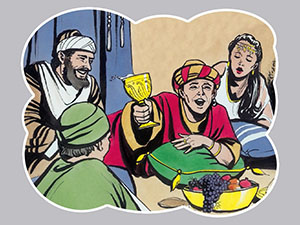 Before we continue, let’s take a quick look at what is meant by “prodigal” because it’s not a term you hear bandied about in modern conversations apart from referring to this parable:
Before we continue, let’s take a quick look at what is meant by “prodigal” because it’s not a term you hear bandied about in modern conversations apart from referring to this parable:
- prodigal
- dissolute; profligate
- dissolute
- self-indulgent; wanton; lustful; unrestrained; depraved; degenerate; drunken
- profligate
- recklessly extravagant; wasteful in use of resources
Once ensconced in his new Idolville digs, he becomes a no-holds-barred party-animal, a Jersey-Shore wannabe. He lavishly indulges his every whim in a single-minded pursuit of sex, drugs, and rock-and-roll.
Oops!
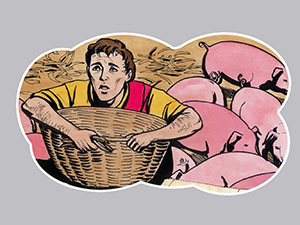 Then the funds run out, the economy tanks, and his fair-weather party-pals abandon him to an ignominious fate without a backward glance.
Then the funds run out, the economy tanks, and his fair-weather party-pals abandon him to an ignominious fate without a backward glance.
- He is alone.
- He is homeless.
- He is starving.
- He now wears only the rags of his formerly fine clothes.
- He is hopeless.
- He is desperate.
HE. HAS. NOTHING.
In desperation, he sinks to the lowest of the low for a good Jewish lad: he lands a job tending pigs, living among them, eating their food out of sheer desperation, and smelling like pig poop.
Think about it: he indeed has a job, but it pays so badly he cannot obtain proper food.
And you think your job sucks!
Back to Jesus’ Audience
By this time, the scribes and Pharisees are vigorously nodding their heads in approval. This is a well-deserved fate for such a worthless dog! He publicly humiliated his father and family! He spat on God’s covenant! He abandoned his homeland to live among idolaters! He lived there in sin! He’s tending pigs!
He deserves to die from starvation! Amen, Jesus! Preach it!
Here’s where the religious insiders anticipated a clinching moral to the story, a fire-and-brimstone condemnation of all immoral behavior. They expected Jesus to give an urgent altar call to those despicable major-league reprobates sitting in their very midst, demanding them to straighten up and fly right! After all, those loathsome stinkers need to repent and be holy like us! If they prove their sincerity long enough, we might even occasionally condescend to speak to them.
Now’s Your chance, Jesus! Sic ’em!
However, Jesus shocks them. Instead of presenting their envisioned call-to-action, He continues with His story…
Jesus Continues
Guilt, shame, and remorse consume The Bad for the consequences of his actions. Without alcohol, drugs, loose women, and partying to anesthetize his conscience, he realizes with horror just how despicably he had treated his loving father.
He “comes to himself” aka “hits rock bottom.” He realizes he doesn’t have to live that way any longer, wallowing in poverty, shame, starvation, and pig feces.
He also realizes he cannot return to his prior sonship position within his dad’s household because there is no recovering from his heinous relational act. He has burned his bridges — deck, piers, handrails, and all! — completely to the waterline.
He will never again be seated at the family Passover seder.
He’ll never again receive a Hanukkah gift from Pop.
Despite all these accurately perceived obstacles, desperation wins the day. Even his dad’s slaves receive better care than what he is experiencing from this miserly pig-farmer. Man, three-hots-and-a-cot working as Pop’s slave absolutely beats the heck out of this!
The Bad maps out a 3-step plan:
- He will leave this dump and return home (repentance). Please note how he didn’t try to bring along his favorite hooker, best-bud party animal, or a herd of pigs with him. He abandoned it all.
- He will resubmit himself to his father’s authority (surrender)
- He will abandon all claims on his previously-abandoned sonship rights (humility)
Like all good plans for a major life-change:
- He bases it upon an accurate assessment of objective reality.
- His solution is reasonable, practical, and achievable.
- Most importantly, he follows through and acts upon it.
Back to Jesus’ Audience Again
By this time, all the religious insiders are getting seriously bent out of shape, thinking, “This can’t be happening! Where’s our altar call!?”
Things go further downhill for them as Jesus describes The Dad’s response.
The Dad
- Was actively looking for him — he had not mentally discarded his younger son, but was eagerly expecting his return. Jesus says it was the father himself who saw the son from afar, not servants acting as lookouts.
- Ran to his son. For him to do that, he had to first gird up his loins (see illustration at right). In the robe-base culture of that day, a family patriarch exposing his legs in that manner was completely demeaning; only slaves, soldiers, and menial workers walked around bare-legged. But his incredible joy at the return of his son far outweighed his temporary humiliation.
- Was filled with compassion, rather than self-righteousness, condemnation, and/or disgust. There was no well-deserved butt-chewing delivered to The Bad for his inexcusably disrespectful behavior.
- Didn’t care one bit about the muck covering his son. Rather than being repulsed by the son’s filth and the nausea-inducing stench, or being fastidiously concerned about getting his own clothes fouled, he tightly embraced and kissed his son.
- Cleaned up his son after he restored and accepted him, rather than demanding the son clean himself up beforehand.
- Had his servants remove his son’s disgusting rags and dress him in a clean robe with fresh shoes. He could have self-
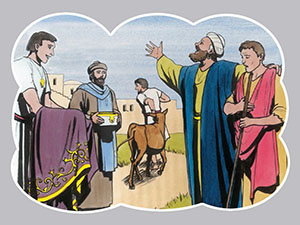 rightfully left his son in his shameful and demeaning attire as a lesson to him, but he didn’t. Had The Dad received his son as a slave, The Bad would have been clothed only a loincloth and been left barefoot.
rightfully left his son in his shameful and demeaning attire as a lesson to him, but he didn’t. Had The Dad received his son as a slave, The Bad would have been clothed only a loincloth and been left barefoot. - Placed a ring on his son’s finger, thus completely restoring The Bad’s position and prestige within the family. This was not merely an adornment as rings are today, but a signet ring used to sign legal documents by pressing the ring into warm wax. Such a ring publicly symbolized the wearer had the authority to speak for his father and conduct business on behalf of the family.
- Threw a party. Despite the public humiliation caused by his younger son’s previous inappropriate behavior, the dad invited all his buds, extended family, and even his servants to a massive feast in honor of his son’s return.
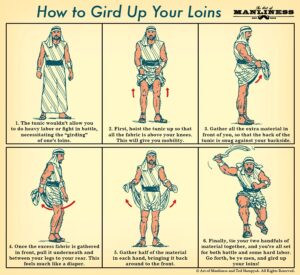
Click to view at full size.
Courtesy of The Art of Manliness
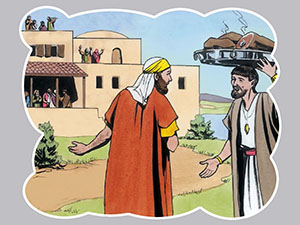
Wow! What a homecoming! In a matter of moments, this kid has gone from zero to hero!
Jesus mentions nothing about it, but we can certainly imagine the incredible gratitude The Bad is feeling towards The Dad right about now. He brought nothing to the table other than humility and even that was out of sheer desperation. His restoration is entirely due to Pop’s off-the-chain mercy and forgiveness.
He who is forgiven much loves much (see Luke 7:47).
The Older Son (The Ugly)
 The Ugly rarely receives much, if any, pulpit attention. Most of the time, preachers mention him merely in passing as if he was almost superfluous. Most ministers I’ve heard focus entirely on The Dad’s homecoming reception of The Bad as an example of God’s grace, forgiveness, and restoration towards us, no matter how far we have strayed.
The Ugly rarely receives much, if any, pulpit attention. Most of the time, preachers mention him merely in passing as if he was almost superfluous. Most ministers I’ve heard focus entirely on The Dad’s homecoming reception of The Bad as an example of God’s grace, forgiveness, and restoration towards us, no matter how far we have strayed.
Why is that?
Because that’s what resonates with us as Christ-followers. We’ve all been The Bad in this story, so we totally get it. As I just said, he who is forgiven much loves much.
If the evil-doers present were Jesus’ sole audience demographic and His story had ended there, we could safely leave it at that and call it a day, running the aisles shouting, “That’s my Heavenly Daddy! Isn’t He amazing? I love my Jesus! HALLELUJAH!!!!”
But Jesus continues with, as Paul Harvey used to say, “the rest of the story.”
The scribes and Pharisees have seriously furrowed brows about now. In their minds, this is not how this story should have transpired! But it’s quickly going to get much, much worse for them; Jesus has just stopped preaching and starts deliberately and aggressively stepping on their toes all the way up to their kneecaps.
You see, His parable is also about them!
Back to Our Story…
The Ugly wearily trudges in from The Dad’s fields with a hoe over one shoulder. He’s completely zonked after a long, hard day working under the burning sun. What he desperately wants is an ice-cold beer, a long, hot shower, a delicious meal, and a good night of well-earned sleep so he can get up tomorrow refreshed — and do it all over again.
But as he approaches the house,he is startled to hear something completely unexpected: a fiesta!
He says to himself, “Self, I am unaware of any party plans. I can’t possibly imagine there’s anything to celebrate. No one I know would even want to attend after my [expletive deleted] excuse-for-a-brother’s behavior. What’s that all about?”
He snags a passing servant and demands, “What the heck is going on here? I’m second-in-command of this household and no one informed me about a party!”
The servant joyfully answers him, “Your brother has safely returned home! Your dad is throwing a massive shindig to celebrate! Remember that heifer we’ve been fattening up for a feast? He had us slaughter it so we can have a barbecue! He’s invited the entire village and all the surrounding farms to join us — everybody’s here, including the village elders!”
The Ugly blows a gasket! He is so offended by the whole idea of his despicable brother receiving such an amazing reception, he refuses to go into the house and join the party.
Again, we Westerners blow right past the significance of his choice to Asian listeners. By defying his father and refusing to come in, The Ugly has publicly shamed him just as thoroughly as The Bad had done a few months prior. But the older son is so apoplectic about the situation, the magnitude of his dreadful choice simply never registers in his mind.
Most dads would have angrily demanded The Ugly come into the house for a well-deserved butt-chewing. But again, The Dad goes out, this time to his resentful elder son. Displaying remarkable consistency, he overlooks his older son’s disrespectful act and treats him with the same tenderness and mercy he had shown towards The Bad.
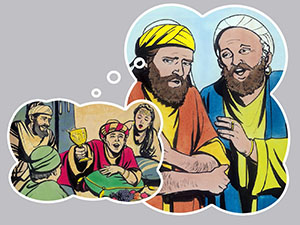 The Ugly responds with a tirade. He chronicles how obedient he has been and how long he has faithfully served his father. The word “served” in the original Greek literally means “slaved for”. In other words, he sees working for his father as slavery rather than service freely given out of love. The Ugly concludes his diatribe with an accusation of unfairness: despite how hard and long he has slaved, daddy never even gave him a baby goat to enjoy with his buddies, yet his despicable younger brother receives a huge barbecue.
The Ugly responds with a tirade. He chronicles how obedient he has been and how long he has faithfully served his father. The word “served” in the original Greek literally means “slaved for”. In other words, he sees working for his father as slavery rather than service freely given out of love. The Ugly concludes his diatribe with an accusation of unfairness: despite how hard and long he has slaved, daddy never even gave him a baby goat to enjoy with his buddies, yet his despicable younger brother receives a huge barbecue.
Like a petulant child, he crosses his arms, pouts, and says, “It’s just not fair!”
The Dad response sounds like he’s paraphrasing a sentence from James 4:2. You don’t have because you didn’t ask. He then concludes with, “Celebrating your brother’s return is the right thing to do.”
With that statement, he was also implying, “Why aren’t you on board with this?”
Luke doesn’t record the Pharisees’ response, but I would bet good money they were fit to be tied right about then!
Our Takeaway
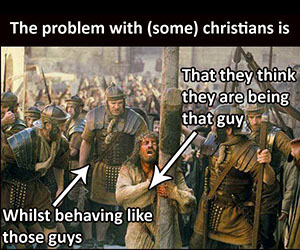 There are two kinds of people in this world:
There are two kinds of people in this world:
- Those who divide people into two groups.
- Those who don’t. 😀
All seriousness aside, I think it’s pretty safe to say we all had counterparts, in varying degrees, among those folks Jesus was addressing that day.
At this point, I could write a scathing diatribe against Phariseeism. I could wrap it up with an urgent call to repentance for those who have fallen into that sin. But in doing that, I would be a total hypocrite because I would be no different from the other Pharisees Jesus thoroughly roasted that day.
Lord knows I’ve witnessed enough Phariseeism to choke a horse over the last 5 decades. Truth be told, for quite a few years I was one myself, though I would have vehemently denied it, saying, “What, me a Pharisee? Seriously? How dare you!”
So I’ve seen this trap from “both sides now.” Frankly, there is not enough lipstick in the galaxy to make that pig even remotely attractive.
The Solution for All
 What I will say in closing is this: no matter where we may find ourselves attitudinally, there is only one Solution:
What I will say in closing is this: no matter where we may find ourselves attitudinally, there is only one Solution:
His name is Jesus.
And what does He freely offer all of us?
Grace!
Notorious sinners and religious folks alike, we are all rebels against the King of the Universe. We have all committed high treason and deserve only an ignominious death. Grace alone qualifies us for a pardon we cannot possibly purchase with money, cannot earn through our dead religious works, and cannot deserve through our futile attempts at righteous living.
We all receive that free gift by faith alone in Christ alone.
For Non-Christians
 First, let me address those who have never surrendered to Jesus. Contrary to popular belief these days, the God of the Bible does not condemn you to eternal damnation. If you end up there, it’s not because of your misconduct and bad attitudes, but because you have refused Jesus’ offer to forgive you for — and deliver you from — them. All it takes for you to receive freedom in this life and heaven in the next is your humble surrender, giving Him complete control of your life. Click here to know more.
First, let me address those who have never surrendered to Jesus. Contrary to popular belief these days, the God of the Bible does not condemn you to eternal damnation. If you end up there, it’s not because of your misconduct and bad attitudes, but because you have refused Jesus’ offer to forgive you for — and deliver you from — them. All it takes for you to receive freedom in this life and heaven in the next is your humble surrender, giving Him complete control of your life. Click here to know more.
I can assure you from the bottom of my heart, if you do this you’ll never regret it.
If you don’t, you will.
For Christ-followers
We who have already made that decision have no moral high-ground from which to pass judgment on any other human being — saved or unsaved! Neither are we allowed to regard those who have fallen as “less-than” because they don’t measure up to “our standards” of how we think a Christian should think, feel, act, or believe.
 As the late Billy Graham used to say, “The ground is always level at the foot of the Cross.”
As the late Billy Graham used to say, “The ground is always level at the foot of the Cross.”
Self-righteousness, from what I read in the Scriptures, is perilously close to the top of God’s pet-peeve list. It implies we generated our own righteousness through our own feeble efforts, rather than simply receiving it through Jesus’ blood and finished work of the Cross.
The Almighty sees our brand of righteousness as “filthy rags” (see Isaiah 64:6). The Hebrew words for “filthy rags” literally mean “a garment soiled from the waist down.” That means God views our futile attempts at legalistic rule-keeping — and the moral snootiness accompanying such a mindset — with the same revulsion we experience towards an infant’s soiled diaper or a badly skid-marked pair of underwear.
Selah!
In Conclusion
For those of us who are “walking out our salvation in fear and trembling” (see Philippians 2:12):
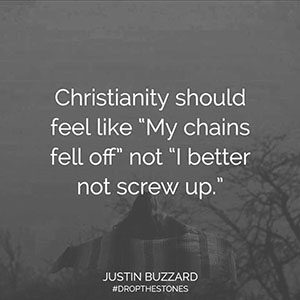
- Remain humble;
- Stay surrendered, and;
- “… Let go of every wound that has pierced us and the sin we fall into so easily , so we will be able to run life’s marathon race with passion and determination. The path has been already marked out before us. Look away from the natural realm and focus your attention and expectation onto Jesus Who birthed faith within us and Who leads us forward into faith’s perfection. “
paraphrased from Hebrews 12:1-2a TPT
It would be good for all of us ask the Holy Spirit to give us “a check-up from the neck up” as King David did:
God, I invite your searching gaze into my heart. Examine me through and through; find out everything that may be hidden within me. Put me to the test and sift through all my anxious cares.
See if there is any path of pain I’m walking on, and lead me back to your glorious, everlasting way — the path that brings me back to you. Psalm 139:23-24 TPT
I can assure you from the bottom of my heart, if you do this you’ll never regret it.
If you don’t, you will.
Been there, done that, got the T-shirt!
Thanks for reading!

